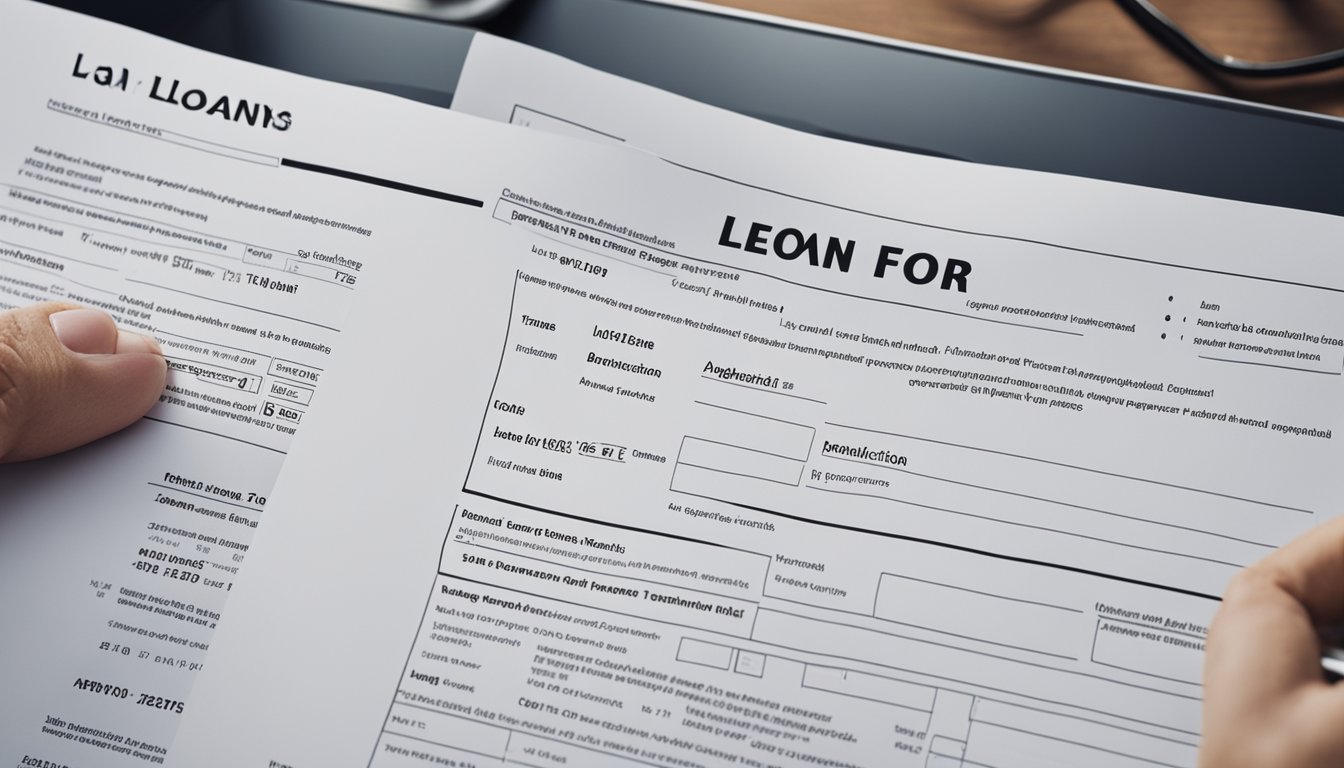If you’re in need of some extra cash, a personal loan could be a good option for you. Personal loans are a type of unsecured loan that can be used to finance a variety of expenses, from home renovations to medical bills. In Singapore, there are many banks and licensed moneylenders that offer personal loans with varying interest rates, repayment terms, and eligibility criteria.

When it comes to personal loans, one of the most important factors to consider is the interest rate. The interest rate is the amount of money you’ll be charged on top of the loan amount, and it can significantly affect the total cost of the loan. In Singapore, personal loan interest rates can range from as low as 3.7% to as high as 19.8%, depending on the lender and your creditworthiness. It’s important to compare interest rates from different lenders to ensure you’re getting the best deal possible.
Understanding Personal Loans in Singapore

If you’re looking to borrow money in Singapore, you may be considering a personal loan. Personal loans are a type of unsecured loan that can be used for a variety of purposes, from home renovations to debt consolidation. In this section, we’ll cover everything you need to know about personal loans in Singapore, including the types of personal loans available, the pros and cons of taking out a personal loan, and more.
What Is a Personal Loan?
A personal loan is a type of unsecured loan that allows you to borrow money without putting up any collateral. This means that you don’t need to have any assets, such as a house or car, to secure the loan. Personal loans are typically used for one-time expenses, such as home renovations, medical bills, or debt consolidation.
Types of Personal Loans
There are several types of personal loans available in Singapore, including:
- Secured personal loans: These loans require you to put up collateral, such as a house or car, to secure the loan. This can make it easier to get approved for a loan, but it also means that you risk losing your collateral if you can’t make your payments.
- Personal instalment loans: These loans allow you to borrow a fixed amount of money and repay it over a set period of time, typically with fixed monthly payments.
- Revolving loans: These loans allow you to borrow money up to a certain limit, and you can use and repay the money as many times as you like, as long as you stay within your limit.
- Line of credit: This is a type of revolving loan that gives you access to a certain amount of credit, which you can use and repay as many times as you like.
- Term loans: These loans allow you to borrow a fixed amount of money and repay it over a set period of time, typically with fixed monthly payments.
Pros and Cons of Personal Loans
Before you take out a personal loan, it’s important to consider the pros and cons. Here are some of the advantages of personal loans:
- They can be used for a variety of purposes.
- They don’t require collateral.
- They can be easier to get approved for than other types of loans.
However, there are also some disadvantages to consider:
- They often come with higher interest rates than other types of loans.
- They can lead to debt if you’re not careful.
- They may not be the best option if you have poor credit.
Overall, personal loans can be a good option if you need to borrow money for a one-time expense and you have good credit. However, it’s important to do your research and make sure you’re getting the best deal possible.
Eligibility and Requirements

Eligibility Criteria for Singaporeans and PRs
To qualify for a personal loan in Singapore, you must be a Singaporean or a Permanent Resident (PR). Lenders typically consider your annual income, credit score, and employment status when assessing your eligibility. As a Singaporean or PR, you will need to provide your NRIC and proof of income to apply for a personal loan.
What Foreigners Need to Know
Foreigners residing in Singapore can also apply for personal loans, provided they hold a valid Employment Pass. Lenders may have specific income requirements for foreigners, and it’s essential to have a stable employment status to enhance your loan approval chances.
Documents Required for Loan Application
When applying for a personal loan, you will need to submit documents such as your NRIC, proof of income (e.g., payslips or income tax assessment), and employment pass (for foreigners). These documents are crucial for lenders to assess your eligibility and determine the loan amount you qualify for.
Interest Rates Explained

If you’re considering taking out a personal loan in Singapore, it’s important to understand how interest rates work. This section will explain the different types of interest rates you may encounter and the factors that affect your interest rates.
Understanding EIR and Advertised Interest Rates
When shopping around for personal loans, you’ll likely come across two types of interest rates: advertised interest rates and effective interest rates (EIR).
Advertised interest rates are the rates that lenders promote to attract borrowers. These rates may be lower than the EIR, which takes into account all the fees and charges associated with the loan. It’s important to compare EIRs when comparing loan options to get a more accurate picture of the total cost of the loan.
The EIR is the true cost of borrowing and reflects the total amount you’ll pay back over the loan term, including fees and charges. It’s calculated based on a formula set out by the Monetary Authority of Singapore (MAS) and is expressed as an annual percentage rate (APR).
Factors Affecting Your Interest Rates
Several factors can affect the interest rates you’re offered on a personal loan in Singapore. These include:
- Credit score: Your credit score is a measure of your creditworthiness and is based on your credit history. A higher credit score may result in lower interest rates.
- Loan amount: The amount you borrow can affect the interest rate you’re offered. Larger loans may come with lower interest rates, while smaller loans may have higher rates.
- Loan term: The length of your loan term can also affect your interest rate. Shorter loan terms may come with lower interest rates, while longer loan terms may have higher rates.
- Competition: The personal loan market in Singapore is competitive, so lenders may offer competitive interest rates to attract borrowers.
It’s important to shop around and compare loan options to find the best interest rates for your needs. Keep in mind that interest rates are just one factor to consider when choosing a personal loan. You should also consider the loan term, fees and charges, and any other features that may be important to you.
Loan Application and Approval

Steps to Apply for a Personal Loan
When applying for a personal loan in Singapore, the process typically involves filling out an application form provided by the lender. You will need to provide personal and financial information, including your income, employment details, and existing debts. It’s important to ensure that you have all the necessary documents ready, such as identification, proof of income, and bank statements.
Instant Approval and Disbursement
After submitting your loan application, some lenders offer instant approval, which means you could receive a decision within minutes. If approved, the funds are usually disbursed quickly, often within 1-2 business days. This speedy process can be particularly beneficial when you need urgent financial assistance.
Common Reasons for Loan Rejection
Loan rejections can occur due to various reasons, including a low credit score, insufficient income, or a high level of existing debt. Lenders also consider your credit history and conduct credit checks to assess your creditworthiness. It’s essential to review your financial situation and credit report before applying to increase your chances of approval.
Costs and Fees Associated with Personal Loans

If you are considering taking out a personal loan in Singapore, it is important to understand the costs and fees associated with borrowing money. Knowing what to expect can help you make informed decisions and avoid any unpleasant surprises down the line.
Processing Fees and Other Charges
When you take out a personal loan in Singapore, you will typically be charged a processing fee. This fee is usually a percentage of the loan amount and can range from 1% to 5% or more. Some lenders may also charge other fees, such as early repayment fees, late payment fees, or annual fees.
It is important to read the loan agreement carefully and understand all the charges associated with the loan. Make sure you know exactly what you will be paying and when. If you have any questions, don’t hesitate to ask the lender for clarification.
Understanding Total Repayment
When you take out a personal loan, you will be required to repay the loan amount plus interest over a specified period of time. The total amount you will need to repay is known as the total repayment.
The total repayment will depend on a number of factors, including the loan amount, the interest rate, and the loan term. The longer the loan term, the more interest you will pay over the life of the loan.
To get an idea of what your total repayment will be, you can use an online loan calculator. This will give you an estimate of your monthly payments and total repayment based on the loan amount, interest rate, and loan term.
In conclusion, taking out a personal loan in Singapore can be a great way to meet your financial needs. However, it is important to understand the costs and fees associated with borrowing money. By doing your research and knowing what to expect, you can make informed decisions and avoid any unpleasant surprises down the line.
Repayment and Debt Management

If you have taken out a personal loan, it is important to have a repayment plan in place to avoid defaulting on your loan. In this section, we will cover some tips on structuring your loan repayment and debt consolidation options.
Structuring Your Loan Repayment
When it comes to loan repayment, it is important to make sure that you can afford the monthly repayment amount. Before taking out a loan, make sure you have a budget in place to ensure that you can comfortably afford the repayments. You can use a loan calculator to estimate what your monthly repayments will be based on the loan amount and interest rate.
If you find that your monthly repayments are too high, you may want to consider refinancing your loan or transferring your balance to a credit card with a lower interest rate. However, be aware that balance transfers often come with a transfer fee, so make sure to factor this into your calculations.
Debt Consolidation Options
If you have multiple debts, you may want to consider a debt consolidation plan. This involves taking out a new loan to pay off your existing debts, leaving you with just one monthly repayment to make. This can make it easier to manage your debts and can often result in a lower overall interest rate.
There are two main types of debt consolidation plans available in Singapore: Debt Consolidation Plan (DCP) and Debt Management Plan (DMP). A DCP is a type of loan that allows you to consolidate your unsecured debts, such as credit card debts and personal loans, into one loan with a lower interest rate. A DMP, on the other hand, is a repayment plan that is negotiated with your creditors to reduce your monthly repayments and interest rates.
When considering a debt consolidation plan, make sure to shop around and compare the interest rates and fees of different providers. You should also make sure that you can comfortably afford the monthly repayments before taking out a new loan.
Overall, having a solid repayment and debt management plan in place can help you to avoid defaulting on your loan and can make it easier to manage your debts. By structuring your loan repayments and considering debt consolidation options, you can take control of your finances and work towards a debt-free future.
Choosing the Right Personal Loan Provider

When it comes to choosing the right personal loan provider, there are a few things you need to consider. In this section, we will discuss how to compare banks and licensed moneylenders, and we will also provide a list of the top personal loan providers in Singapore.
Comparing Banks and Licensed Moneylenders
When choosing a personal loan provider, you have two options: banks and licensed moneylenders. Banks are more established and offer lower interest rates, but they also have stricter eligibility criteria. Licensed moneylenders, on the other hand, offer higher interest rates but are more flexible when it comes to eligibility criteria.
To help you decide which option is best for you, we have created a comparison table:
| Criteria | Banks | Licensed Moneylenders |
|---|---|---|
| Interest Rates | Lower | Higher |
| Eligibility Criteria | Stricter | More Flexible |
| Loan Amounts | Higher | Lower |
| Loan Tenures | Longer | Shorter |
| Approval Time | Longer | Shorter |
Top Personal Loan Providers in Singapore
Here is a list of the top personal loan providers in Singapore:
- UOB: UOB offers personal loans with interest rates as low as 3.68% p.a. and loan amounts of up to 6 times your monthly salary.
- DBS: DBS offers personal loans with interest rates as low as 3.88% p.a. and loan amounts of up to 10 times your monthly salary.
- HSBC: HSBC offers personal loans with interest rates as low as 3.7% p.a. and loan amounts of up to 8 times your monthly salary.
- Standard Chartered: Standard Chartered offers personal loans with interest rates as low as 3.48% p.a. and loan amounts of up to 4 times your monthly salary.
- OCBC: OCBC offers personal loans with interest rates as low as 3.5% p.a. and loan amounts of up to 6 times your monthly salary.
- CIMB: CIMB offers personal loans with interest rates as low as 3.5% p.a. and loan amounts of up to 8 times your monthly salary.
- Licensed Moneylenders: Licensed moneylenders offer personal loans with interest rates ranging from 6% to 12% p.a. and loan amounts of up to $3,000 for Singaporeans and Permanent Residents, and up to $1,500 for foreigners.
When choosing a personal loan provider, it’s important to compare interest rates, eligibility criteria, loan amounts, loan tenures, and approval time. By doing so, you can find the best personal loan provider that suits your needs and budget.
Specialised Personal Loans

If you’re looking for a personal loan that’s tailored to your specific needs, there are a few specialised options available in Singapore. These loans can help you cover the costs of education, weddings, home renovations, and medical emergencies.
Personal Loans for Education
Education is an important investment in your future, but it can be expensive. If you’re struggling to pay for tuition, textbooks, or other education-related expenses, a personal loan for education might be a good option for you. These loans typically have lower interest rates than traditional personal loans and can be used to cover a wide range of education-related expenses.
Wedding Loans
Weddings can be expensive, and if you’re not careful, you can quickly find yourself in debt. A wedding loan can help you cover the costs of your big day, from the venue and catering to the dress and decorations. These loans typically have lower interest rates than credit cards and can be repaid over a longer period of time.
Home Renovation Loans
If you’re planning on renovating your home, a personal loan for home renovations can help you cover the costs. These loans can be used to pay for everything from new flooring and paint to a complete kitchen or bathroom remodel. Home renovation loans typically have lower interest rates than credit cards and can be repaid over a longer period of time.
Medical Emergency Loans
Medical emergencies can be expensive, and if you don’t have insurance, you could be facing a hefty bill. A personal loan for medical emergencies can help you cover the costs of medical bills, including hospital stays, surgeries, and medications. These loans typically have lower interest rates than credit cards and can be repaid over a longer period of time.
Overall, specialised personal loans can be a great option if you need to cover specific expenses. Just be sure to shop around and compare interest rates and terms before committing to a loan.
Frequently Asked Questions

How can you calculate your monthly repayments for a personal loan in Singapore?
Calculating your monthly repayments for a personal loan in Singapore is simple. You can use online calculators available on the websites of banks or licensed moneylenders. These calculators will help you determine your monthly repayments based on the loan amount, repayment period, and interest rate.
What are the eligibility criteria for expatriates seeking personal loans in Singapore?
The eligibility criteria for expatriates seeking personal loans in Singapore may vary from bank to bank. Generally, expatriates must have a valid work permit, proof of income, and a good credit score. Some banks may require additional documentation such as a letter from the employer and a copy of the passport.
Can you use your Central Provident Fund (CPF) to secure a personal loan?
No, you cannot use your Central Provident Fund (CPF) to secure a personal loan. CPF can only be used for specific purposes such as housing, healthcare, and education.
Which bank offers the most competitive personal loan rates in Singapore?
Different banks may offer different interest rates for personal loans in Singapore. It is advisable to compare the interest rates and terms of different banks before making a decision. Some of the banks that offer competitive personal loan rates in Singapore include DBS Bank, OCBC Bank, and UOB Bank.
How does one identify a favourable interest rate on a personal loan?
A favourable interest rate on a personal loan is one that is lower than the market average. You can identify a favourable interest rate by comparing the rates offered by different banks and licensed moneylenders. It is also important to consider the loan tenure and other terms and conditions.
Are there any tips for securing the best possible interest rate on a personal loan?
Yes, there are several tips for securing the best possible interest rate on a personal loan in Singapore. These include maintaining a good credit score, providing accurate and complete information in the loan application, negotiating with the bank or licensed moneylender, and choosing a shorter loan tenure.

